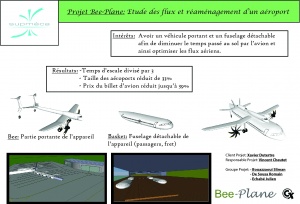Difference between revisions of "Bee-Plane TRL 2"
Jump to navigation
Jump to search
Basket is design to be optimum for passengers frequent flight, then it is adapted to other usage (fret, hospitals...)
Basket with three pressure bubbles, Internal structure adapted to 3-3-3 seats configuration
Central luguage area for passenger basket (220 PAX full eco, 200 PAX in 2 classes), Only 1 central large main door on each side.
Basket with APU, 4 electric directional wheels, fuel tanks between bubble spaces
Bee
Flat surface bellow bee with ISO standard dimensions (width 2,44m)
1 pilot behind each other, or only 1, or even none.
Access between basket/bee is planned to be just before front attach system of the main wing.
2 turbopropeller TP400 on main wings, 1 central turbofan (SAM 146) on the back,
or even 2 on the back for military usage(Silvercrest * 2), and 4 propeller on main wing.
Variable inlet casing for rear turbofan, behind cockpit and wings, diameter of the turbofan = 1m.
Landing Gears and wings
Bi-taildragger configuration, with lower rear wings that finish with vertical ends for each wheels.
Landing gear with external rotation. Wheels goes behind Turboprop engines
Upper rear wings that goes out at 45°, from the attach system point.
EM Normandy : Partnership strategy
SupMeca : Airport Studies

SupMeca : overall design studies and Collaborative projet
SupMeca : landing gear definition
File:File:Supmeca TP 2013 Poster.pdf
File:Supmeca TP 2013 Rapport Final.pdf
File:File:Supmeca TP 2013 Soutenance.pdf
Estaca Laval 4A : Rear wings
File:Soutenance de projet Empennage Bee-Plane Tail 2013.pdf
File:Rapport de projet Bee-Plane 14 01 2014 vFinal Tail 2013.pdf
Projects started in september 2013 Ecole Centrale Paris : AAS Analysis for Aircraft Sizing tool, and implement lateral flight stability calculation.
Estaca : Cabin Layout for full eco passengers basket, Structural studies, Inboard Energies, certification
Supmeca : Coordination, main landing gear, airlines economical model
IFMA Clermont : Rear landing gear, airport, mechanical studies
Trinity College : Accoustic
To be defined INSA Rouen : Continue Engines parametric model (and apply to different future aircraft configuration, including BeePlane)
EM Normandy : Partnership strategy
Wiki.admin (talk | contribs) |
Wiki.admin (talk | contribs) |
||
| Line 66: | Line 66: | ||
<li> EM Normandy : Partnership strategy | <li> EM Normandy : Partnership strategy | ||
<li> SupMeca : [[Airport Studies]]<BR> | <li> SupMeca : [[Airport Studies]]<BR> | ||
| − | [[File:Supmeca Logistique 2013 Poster Bee-Plane.jpg ]] | + | [[File:Supmeca Logistique 2013 Poster Bee-Plane.jpg|300px]]<BR> |
| + | <BR> | ||
Revision as of 12:42, 19 January 2014
TRL 2 starts in 2013. It is planned to have a 2 years duration.
Projet and tasks are made according to Lesser Open Bee License 1.3
Bee-Plane TRL 1 Year 2012 : Aeronautical configuration to be studied in details is resulting from TRL1.
TRL2 Project Overview
Project description at beginning of TRL2 :
- Project overview : File:20131124 Bee-Plane - Description v5-3.pdf
- Light numerical mock-up : Bee-Plane Google Sketchup
- FP7 Submission file : File:BeePlane PartB Proposal v2.pdf will be presented again in Horizon 2020.
Additional documentation and numerical mock-up
All technical work done according to the open source paragraph of the Lesser Open Bee License 1-3 is available within a dedicated IT server. Access is provide on request.
Guidelines
Basket
Bee
Landing Gears and wings
Studies
Studies will includes
- Configuration definition
- Aerodynamic
- Mechanical
- Accoustic
Projects already finished (june 2013)

File:File:Supmeca TP 2013 Poster.pdf
File:Supmeca TP 2013 Rapport Final.pdf
File:File:Supmeca TP 2013 Soutenance.pdf
File:Soutenance de projet Empennage Bee-Plane Tail 2013.pdf
File:Rapport de projet Bee-Plane 14 01 2014 vFinal Tail 2013.pdf
Projects started in september 2013
To be defined












